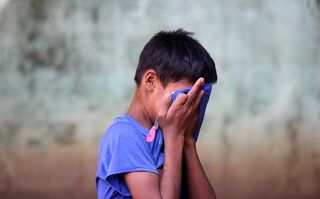Stress
Dangers of Childhood Stress and Tips for Easing the Strain
Chronic stress can negatively affect a child's brain chemistry.
Posted December 6, 2020

All children are bound to experience stress at some point in their lives. But when stress becomes overwhelming, parents have reason to be concerned. Behavioral and emotional shifts that indicate their child’s stress has reached a tipping point include:
- A sudden drop in grades
- A change in attitude
- Disinterest in friendships
- Trouble focusing
- Difficulty sleeping
- Obsessive worry or rumination
When kids experience chronic stress, their brain chemistry can quite literally be altered in a way that can have negative effects on their long-term health. (For more details on the effects of childhood stress visit "We The Parents.")
Understanding Three Types of Childhood Stress
Children face all kinds of stressful situations such as learning to walk, read, write, and navigate social interactions. These kinds of stress are normal and healthy. Stressors can typically be understood as follows:
Positive Stress
Positive stress is generally overcome with minor support. It can be triggered by things like meeting new people, trying something for the first time, or a routine doctor's visit. Resolving this form of stress can ultimately boost self-confidence and self-assurance.
Tolerable Stress
Tolerable stress refers to things that are difficult, but a part of life. This can include losing a loved one, experiencing a natural disaster, or having a scary medical incident such as a broken bone or appendicitis. Plentiful love and support from parents can help to guide kids through these experiences. In some cases, therapy can also be helpful.
Toxic Stress
Toxic stress is triggered by situations of abuse and neglect. It's often marked by sudden, drastic behavioral changes such as overwhelming depression or anxiety. Toxic stress can have serious long term consequences and demands immediate intervention from parents and professionals.
Common Childhood Stress Triggers
Fear of Death
Children experiencing death for the first time are especially vulnerable to stress and are often traumatized by sudden losses. This could include the loss of a friend, family member, or even a pet.
Coping Tips: Reassure children by sharing memories and pictures. Celebrate and recall the good time that you had together. It’s also healthy to grieve and embrace sadness with your child. At times of loss, children may experience some regressive behaviors such as clinginess or fearfulness. They will need extra love, patience, and attention.
Overcrowded Schedules
Parents often make an effort to maximize time spent on extracurriculars and sports, but packed schedules can leave kids struggling to catch their breath. Overwhelmed children inevitably start to feel like they're underperforming. Remember, downtime is equally important to a child’s well-being.
Coping Tips: If your child seems stressed, or their academic, extracurricular, or sports performance is declining, be receptive to the idea that it's time to cut back or reorganize their schedule. Respect their need for free time, resist packing weekends with scheduled activities, and promote more self-care time.
Academic Difficulties
Even children who aced last year's curriculum with minimal effort may find new material challenging. When kids fall behind in school or can't keep up in the classroom, their self-esteem takes a big hit as well. (See "How to Spot Learning Disabilities.")
Coping Tips: If your child is struggling in school, set a meeting with the teacher to problem-solve together. Design an academic plan that will address your kid’s needs. Resist punishing or expressing frustration, focus on getting them the help they need. Don't be afraid to advocate for your child if you think they should be evaluated for learning differences.
Do your part to create an environment and lifestyle that spares your kid from unnecessary stress. This can mean recognizing and owning your own role in contributing to your kid's stress. Develop a mindfulness practice, shift away from criticisms and punishments, and focus on problem-solving and meaningful communication. Modeling such behaviors will lower your child's stress — and yours as well.
Need more parenting encouragement? Here you go:
- Is Parenting Burnout Destroying Your Relationship?
- Bedtime Routines Every Child Needs
- How to Make Your Kids Experts in Happiness
For information on parenting workshops, visit my website.




